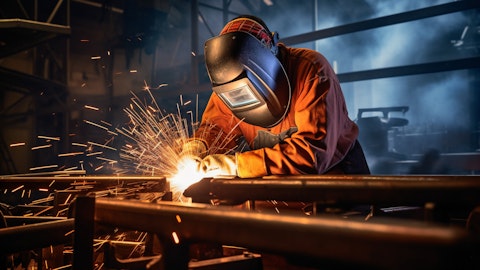Dennis Scannell: I think you said that with rolls being up and – forged rolls being up and cast rolls down, I guess, particularly in Europe, thinking overall flattish sales. So we should be seeing margin improvement, though, in 2024 with – and I’m thinking particularly in the second half, with the investments we’ve made. Is that a fair kind of assumption?
Sam Lyon: Yeah, it’s fair. The only offset would be revenues flat, the volumes down. So we have an offset in activity in the second half with higher margins on what’s going out the door. So, yes, we’ll see better margins in the second half.
Dennis Scannell: Dave, obviously, Air and Liquid Products has been just a really nice success story here. But following up on the previous questioner’s comments, the fourth quarter orders did look really light relative to where we’ve been. Was that all Buffalo Air? Was there other things going on? Doesn’t look like there’s a whole lot of seasonality in the business because last year’s fourth quarter, I’m talking fourth quarter of 2022, was pretty strong. So just any more color on the lightness and orders in the fourth quarter of 2023.
David Anderson: The Buffalo Air, certainly, as I talked about, was one of the impacts. The other one, Buffalo Pumps, was light in the fourth quarter, which happens sometimes when you’re dealing with government contracts. Sometimes they want to get them placed or don’t. While that was slower in the fourth quarter, we saw it pick right back up in January and February. So I think that for pumps, it was just a timing issue. For Buffalo Air, it’s an issue of a bit of a product of our success in bookings that we have simply sold out a lot of our capacity.
Dennis Scannell: Just for clarity, the grant from the US Navy for manufacturing equipment, is that for additive manufacturing or is it for a different process?
David Anderson: It’s for a different process. These are CNC machines. This is separate from the funding they provided for the additive work we’re doing with them.
Dennis Scannell: Mike, thinking about cash flow for 2024, it was very helpful, that first questioner, on kind of separating out the maintenance cap spending because that $15 million to $20 million was a lot higher than I had been penciling in.
Mike McAuley: Sorry about that.
Dennis Scannell: No worries, no worries. It’s a sharp in-draw of breath, but I feel better now. But for 2024, it’s going to be higher than that $10 million to $11 million. I’m guessing we have $4 million left in the forged businesses capital program. So, would we expect it closer to $15 million or $16 million, or am I being too pessimistic there?
Mike McAuley: Well, first of all, we’re probably going to spend about $18.5 million on the Forged and Cast modernization program, not the full $20 million. That’s one piece. That’s how much we’re going to use on the equipment financing facility. So that’s one piece. And it’s funded. So, yeah, we will have CapEx, our original business plan was something in the range of $10 million, $11 million. It might creep a little higher than that, Dennis, but it’s not going to be much higher than that. And it’s definitely a big step down from 2023, where we had a lot of the spending going on for the major program.
Dennis Scannell: And working capital, would you think that would be a source of cash in 2024, particularly kind of no growth on the roll business?
Mike McAuley: That’s kind of the thought process for the construction of our 2024 outlook, is that we’re expecting that working capital doesn’t at least provide additional pressure in terms of cash flow from operating activities.
Dennis Scannell: One last thing. And I know on the asbestos issue, and I know these calculations are very complicated, but just looking at your reported results, when you talk about the cost per case settled, it’s actually gone down. It was like $22,000 in 2020 and 2021, and in 2023 it was under $19,000. Just kind of curious. But the actuaries or whomever are doing these calculations are saying, no, we’re expecting that to go higher going forward.
Mike McAuley: That’s a very good question, Dennis. But, usually, we don’t do revaluations every year. We do them every couple, several years. Because you hate to jump and do a whole revaluation, and then suddenly things change in variables. And some of the most sensitive variables in the entire valuation are average settlement values and the claim mix. And those are the two things that have caused the increase here. If you think about when we did the last valuation a few years ago, we were looking at a rolling average that pulled in multiple years prior to the current data. And those values were more in the range of 14, 15-ish kind of numbers. And now that they’ve stepped up, that’s kind of the rationale.


